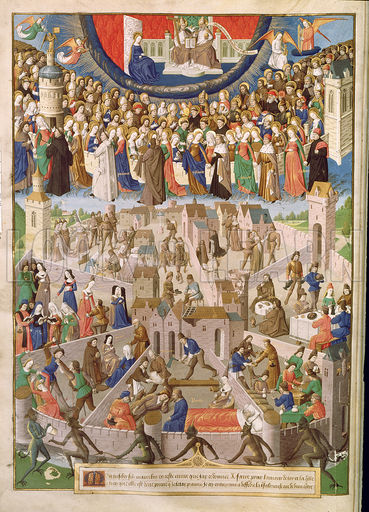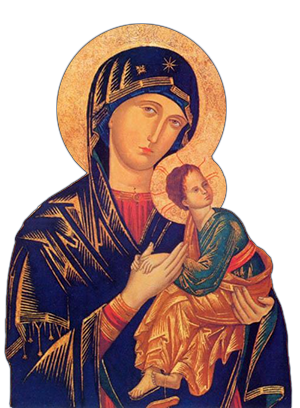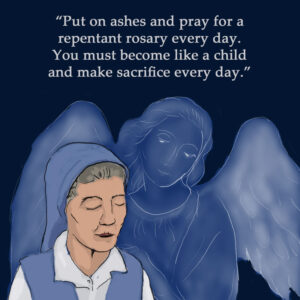Caffrey: Heroic Virtue Part 2, City of God

(Cross-posted from faithpilgrims.com)
On August 24 in the year of our Lord 410, a cataclysmic event occurred that many thought could never happen: the sack of Rome!

To try and put this historic happening into perspective, think of Pearl Harbor and 9/11 with the imagined “sack” of New York City and Washington, D.C.–combined–and you will have an idea of the massive scale of Rome falling.

This was the capital of the greatest empire the world had ever known. Its citizens never imagined such a thing, because Rome was known as the “Eternal City”—it would last forever. Records indicate that those who experienced it or learned of it felt as though the world had ended. As a result, people were desperate for answers and for a culprit or, more accurately, a scapegoat.
What to believe in? After all, the great emperor Constantine had “legalized” Christianity after centuries of persecution. So, why had the Christian God allowed—or caused—this collapse? Many still believe that the barbarians’ invasion caused it. But with historical and archeological research over time comes the better understanding, and we learned that Rome was teetering from the decay of moral, political and financial corruption and made itself vulnerable to Alaric and his Visigoths.
Since Pagans blamed the Christian God for the devastation, they turned their ire toward his Christians. The growing troubles between Pagans and Christians made a terrible situation even worse, despite the great irony that these very same Christians offered them sanctuary in their churches, because the Goths would not enter those churches. Those “barbarians” (from the stammering foreign language heard as “bar bar” by the Romans) actually gave respect to the Christians and their Christ, and spared the sacred places in which those pagans sought shelter!
From this chaos emerged a heroic Christian bishop, one who went to great efforts to encourage those in his flock and well beyond, to maintain their belief in the God of Christianity despite their suffering and loss (Where are our heroic bishops? They seem hard to find–except in the underground Church in China!)
_-_The_Four_Doctors_of_the_Western_Church%252C_Saint_Augustine_of_Hippo_(354%25E2%2580%2593430).jpg&f=1&nofb=1)
He did this through his writings and many homilies over a period of years. The result was a book that is every bit as relevant for our day as it was for his: The City of God.
“The glorious City of God is my theme,” he said. “I have undertaken its defense against those who prefer their own gods.” And today, we have made many gods: materialism, scientism, rationalism, feminism, gender-ism, etc, etc. Our “Visigoth” are the many citizens who have received an education through the U.S. public school system, one that no longer teaches about God, faith, honor, virtue and patriotism, or about the “other”, but one that does teach its students about “me, me, me”, and to be victims. We need more clergy to stand as Augustine did, and become the vanguard leaders that we can follow against the moral and civic decline.
Those of us who do this will suffer. Augustine asserted that which we all know, that suffering comes to everyone. After all, “He (God) makes the sun rise on the evil and the good, and the rain fall on the just and unjust.” (MT 5:45) Continuing with this point, he says “There is a very great difference in the purpose served by both adversity and prosperity. For the good man is neither uplifted with the good things of time nor broken by its ills (my emphasis); but the wicked man, because he is corrupted by this world happiness, feels himself punished by its unhappiness. Ultimately, Augustine says, “the important difference is, not what ills are suffered, but what kind of man suffers them.
Augustine argued that Rome fell largely because the Empire discarded virtue as its main pillar.
All his efforts were to show the contrast: City of Man (the “Earthly City” vs the “City of God”)
- The City of Man: love of self, even to the contempt or rejection of God
- The City of Man loves power and domination over others, which in turn makes the oppressed lust for power so that they can dominate the oppressors
- He pointed out how their many gods could not save the city of Troy. In fact, those gods were conquered. So why expect them to save Rome?
Atrocities in war are the nature of war, Augustine wrote, so what was unique in Rome’s fall was the clemency and leniency shown by the barbarians toward Christians. None were forced from the churches to be killed or to be slaves. To this, Augustine wrote, “Whoever does not see that this is to be attributed to the name of Christ is blind!”
Augustine methodically took apart the pagans’ belief that worshipping their gods will ensure eternal life, partly by showing that their worship was not out of love for them but out of love for their own desires. And that is our challenge, as we see, hear and read about the turmoil in the very divided United States, from a growing number of its citizenry that rejects the aspirational goals of the nation’s founding documents.
- How are our lives oriented? To what? Or…to Whom?
- Do we pray for that which we want?? Or do we do as Augustine did in his other great work, The Confessions, and gush with praise for God and his glory?
- Do we learn from King David, and pour forth our love of God and our praise of him, as that patriarch did in his many Psalms?
- We can enjoy some or much of the blessings of the Earthly City, and we should meet our responsibilities as members of the human race and as American citizens; but we must know that our true home and ultimate destiny is not Earth.
The City of God is shaped by the love of God, humility of self, charity to the less fortunate and hope for the true eternal city: Heaven! Eyes on Christ! Jesus exhorted his disciples—you and me—“You are in the world but not of it. If you were of the world, the world would love its own. Yet because you are not of the world, but I chose you out of the world, the world hates you. (Jn 15:19) So, I ask my fellow readers: “how will you respond?“
Twenty years later, Augustine lay dying on the cathedral floor, and witnessed the sacking of his beloved North African city: Hippo. So, the city of Hippo would be no more. The Cathedral would be destroyed. But the reality behind the Alpha and the Omega inscribed on the floor of the Cathedral where he lay dying, is eternal. Today it seems that we witness very little heroism from our bishops, especially in the context of practicing our faith in the context of the pandemic. So, I urge the Church’s shepherds to “Tolle Lege” (“takex it up and read”) Saint Augustine’s City of God, to help them stand athwart the secular–and internal– challenges to the faith!
Amen.
Thomas Caffrey is an author and co-host of The 13th Apostle on WQPH. Read Part 1 of this article here.



